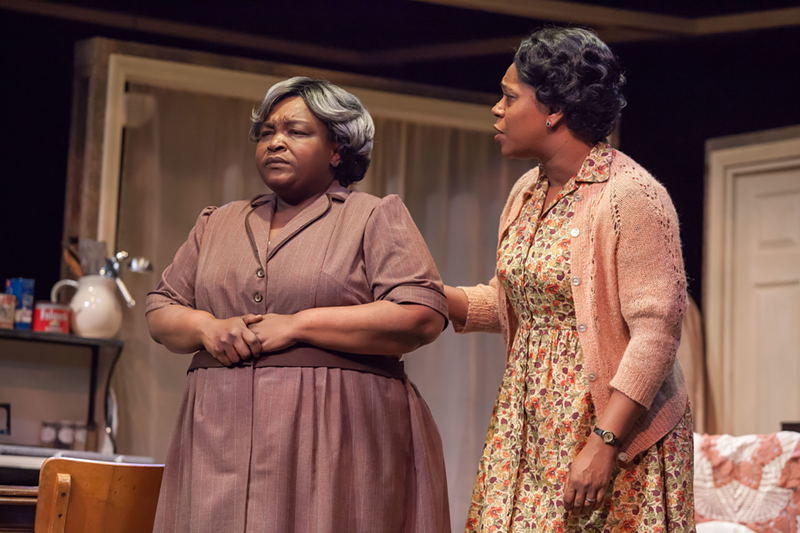What a revelation it is to watch Cincinnati Shakespeare Company tackle this production so expertly. For one thing, it is somewhat uncommon to see work by a female or African-American playwright on a stage largely dedicated to, for instance, Richard III and The Tempest. Cincy Shakes has already proven that its skill extends to staging contemporary classics such as To Kill a Mockingbird and The Grapes of Wrath. This current production ofA Raisin in the Sun, running through April 15, should crown the list of those successes.
Raisin opens in a small apartment in Chicago. Scenic designer Shannon Moore has created a believable home on stage, packing every corner of the tight space to establish the Younger family’s South Side residence. The apartment isn’t cluttered or dirty, but very full since a family of five shares two bedrooms and a closet-size kitchen. We can sense the Younger family’s claustrophobia. Moore has given the space soft neutral colors except for one bright white rectangle — a photo of the recently deceased patriarch, Walter Younger.
The Younger family slowly unfolds from various corners of the cramped house. First we meet Ruth (Torie Wiggins), as she rouses her sleepy pre-teen son Travis (Shadow Avili’). We rarely see Ruth without an iron in her hand or an egg on the skillet; Ruth performs domestic work for a meager living and then maintains her own home on her off-hours. Our hearts go out to the hardworking Ruth, patient and slightly wilted by the labor and by tension within the family. Wiggins’ performance is mature and tender.
Geoffrey Warren Barnes II is Walter Lee Younger, Ruth’s husband, a dreamer watching his life whimper by. Walter Lee is Willy Loman-esque, a man faltering as a provider and as a father, starving for an opportunity to get ahead. Walter Lee is an understandable character, if not often a loveable one. Barnes nails it, from the heights of Walter Lee’s charming optimism to the lows of his hangdog desperation.
Walter Lee’s sister Beneatha (Renika Williams) has her own bouquet of dreams. “Benny” is going to be a doctor, marry for love, design an identity that feels true to her. At 19, Benny sees her best years sprawled out ahead of her and she refuses to settle for anything. In a cast full of consummate professionals, Williams’ debut with Cincy Shakes keeps pace with the heavies, even shines.
And finally we meet the matriarch, Lena Younger, played by Burgess Byrd in spectacular form. Lena is so self-assured and strong that we forget — until she reminds us, heartbreakingly — that she is mourning the recent loss of her husband, “Big Walter.”
His passing — and specifically, his life insurance payout — jolts the Youngers into the dilemma at the center of the story: What is Lena to do with $10,000, more cash than any of the Youngers has ever seen before? Such an amount in the 1950s would equate to more than $100,000 in 2017, no small sum, and the dreams it might buy dazzle nearly everyone in the family.
A small cast of supporting roles also traipses through the Younger apartment, including two potential suitors for Benny: Joseph Asagai (Darnell Pierre Benjamin) and George Murchison (Crystian Wiltshire). Also worth a mention is Shanessa Sweeney as the Youngers’ wrecking ball of a neighbor, Mrs. Johnson. Sweeney adds humor to acts as small as shifting her chair, and the opening night audience loved her.
“What happens to a dream deferred?” asked Langston Hughes in his 1951 poem “Harlem.” “Does it dry up/like a raisin in the sun?” Hansberry also asks that question, and while she does not directly answer it, her Raisin in the Sun suggests that family and love play a big part in sustaining our dreams and braving the reality of our future.
Director Christopher V. Edwards has assembled a cast that gels as a family and breathes life into Hansberry’s moving story.
A RAISIN IN THE SUN is at Cincinnati Shakespeare Company through April 15. More info: cincyshakes.com.


